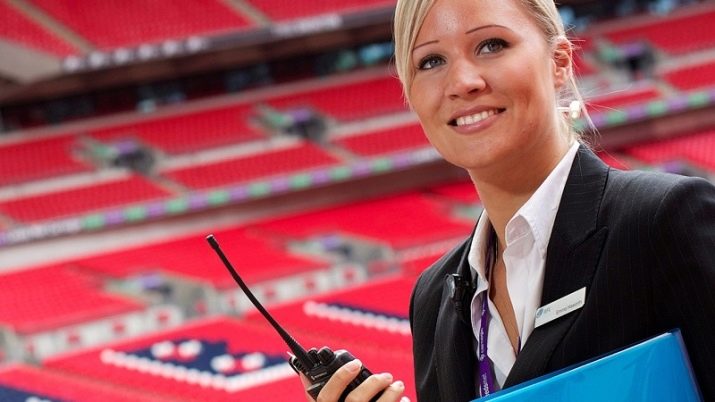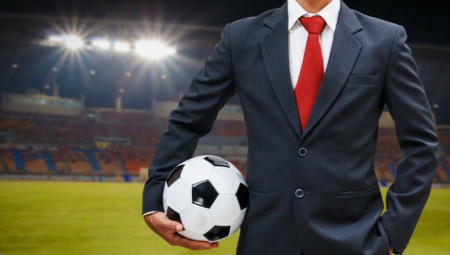It is no secret that modern sport is not only high-profile victories, cups and medals, but also a lot of money. Winning fees are increasing every year, plus multi-million dollar advertising contracts. And this applies both to team and individual sports. Football, hockey, tennis, basketball, volleyball, boxing - all this is not only huge stadiums and crowds of fans, but also money.
And while the athletes are preparing for tournaments, specially trained people - sports managers - are watching them, and at the same time, and their wallets.
Profession Features
Let's try to figure out who these people are. A sports manager can work in both a professional and an amateur club. Wherein his terms of reference are quite wide. He can, for example, invest in the development of private schools or in competitions, search for, and then develop talented children, who then, becoming champions, not only confirm the professionalism of their manager, but also make him richer.

Responsibilities
The sports manager helps the ward to earn not only medals, but also financial resources, in turn, receiving his bonuses for well-organized management as a reward. There is another widespread type of activity of a sports manager - he invests his own money in a particular athlete or club, then he receives income, as in any other business.
In the fitness industry, professionals are also sometimes called sports managers, but they do a completely different job. Their task – attract as many people as possible to amateur sports, that is, expand the client base, and therefore, increase the income of the organization in which they work. In our case, we are talking about professional teams or athletes, which means that attention is paid not only to quantity, but also to quality.
It does not play a significant role at what level the team is represented: urban, regional, federal or international.

Personal qualities
To become a real sports manager, certain strong-willed qualities and character traits are required. Contrary to popular belief that former athletes who know and understand the “inside out” of the world of sports can act as a manager, this is far from the case. Among the main personal qualities that the specialist in question should possess are perseverance and sociability. Which, unfortunately, is very rarely a "skate" of professional athletes. This is simply not their element, with rare exceptions. A sports manager needs not only to be able to communicate, but also to do it in different languages of the world, well, or at least in confident basic English.
Besides, a sports manager is a public person, which means that it is important for him to have a presentable and well-groomed appearance, to be able to present himself, to have good communication skills, and to negotiate at different levels. Sometimes you need to be able to persuade your wards, and sometimes - potential sponsors, government representatives. Without their help, often the development of a club is simply impossible, especially when it comes to small teams based in small, poor cities.
A successful sports manager must have the analytical skills and, if you want, a certain gift of prediction. To understand whether a real sports star can grow out of a boy from a yard team, it is not enough to know what physical data is needed for this. You need to be able to discern the player’s potential. This skill helps to work in the future.
It is difficult to imagine a professional sports manager who would not be interested in sports. Therefore, these people are real fans who attend a lot of tournaments. It is there that they find potential champions.

How to become
Just like any other manager, a sportsman needs special training, and subsequently qualification retraining. In sports, everything is changing; the old rules and trends are being replaced by new trends. You can get the profession of manager in the field of sports in specialized universities and ordinary universities.
In practice, often a person with financial, legal, sociological or any other education comes to sports management, falls in love with sports and makes a good career in this area. However, such people also need retraining courses. There are a lot of them in Russia today. Many are carried out remotely, through online webinars are available for a fee.
As for professional higher education, it can be obtained both at Moscow State University and at any regional institute in the department of physical education. Here is a list of only a few universities where such education is given:
- Financial University under the Government of the Russian Federation;
- Ural Federal University named after Boris Yeltsin;
- State University of Penza;
- Chelyabinsk South Ural State University;
- Institute of Industrial Management in Moscow;
- State University in Kurgan;
- Polytechnic University of Peter the Great in St. Petersburg;
- Georgy Plekhanov Russian University of Economics;
- Russian State University of Physical Culture, Sports, Youth and Tourism;
- State University of Togliatti;
- Nicolas Lobachevsky National Research State University in Nizhny Novgorod;
- City Pedagogical University in Moscow;
- State University in Tyumen;
- State Social and Pedagogical University in Samara;
- Far Eastern State Academy of Physical Culture and many, many others.

Moreover, you can choose a convenient form of training: full-time, part-time, part-time, and even distance learning. Among entrance examinations, various universities and departments offer different combinations of exam. Among them are specialized mathematics, the Russian language, social studies, biology. And here are the following disciplines that the future certified sports manager will study:
- economics;
- management of sports facilities;
- sports law;
- psychology
- physical education management;
- conflict resolution;
- philology and a number of other sciences.
If you want not only to get a diploma, but also to raise your athlete or the whole team to the highest step, then you should go to this start. Ahead will certainly be the victories of your wards, multi-million dollar contracts with sponsors, big tournaments, crowds of fans and as a result - a stable business, solid financial and social status.
According to statistics of popular job placement sites in Russia, today more than 23 thousand sports managers are required. The average person’s salary in such a position is 31 thousand rubles; in most regions, proposals for payment exceed 55 thousand rubles. At the same time, the minimum payment is about 22 thousand, but the maximum is more than half a million.












